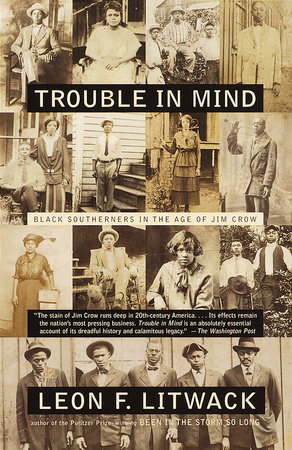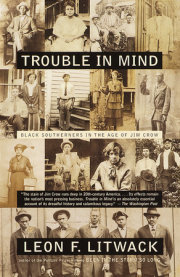BAPTISMS
My grandmother and other people that I knowed grew up in slavery time, they wasn't satisfied
with their freedom. They felt like motherless children--they wasn't satisfied but thy had to live
under the impression that they were. Had to act in a way just as though everything was all
right... Had to do whatever the white man directed em to do, couldn't voice their heart's desire.
That was the way of life that I was born and raised into.
--Ned Cobb
What did I do
To be so black
and blue?
--From a song popularized by Louis Armstrong
THE PINE-BOARD SHACK in which Charlie Holcombe spent his childhood in the late
nineteenth century rested on top of a red clay hill about a quarter of a mile from
the main road in Sampson County, North Carolina. His father, a tenant tobacco farmer,
rose each morning at four o'clock, laid the logs for a fire, and roused the
children, while Charlie's mother prepared a breakfast consisting of a pot of grits
and a slab of salt pork. It was important to be in the field at sunup during the
growing season, as the soil was poor and the labor that much more demanding.
They worked till sundown.
Grandfather Holcombe did not work in the field; he had "de miseries" in his back
and walked with a stick. But he performed other chores, slopping the hogs and
feeding the chickens. Charlie Holcombe, considered too young and frail to work
in the fields, helped his grandfather with the chores and often accompanied him
to the nearby creek to catch "a mess o' catfish" for supper. As they sat there,
waiting for the fish to bite, Grandfather would "do a heap o' thinkin'." And
sometimes he shared his thoughts with Charlie, his youngest grandson, often
imparting practical lessons drawn from his own life on how a black boy
might hope to survive in the South less than half a century after emancipation.
Charlie remembered one lesson in particular. After catching a large catfish,
Grandfather Holcombe toyed with it for a time, admonishing his grandson to
watch him. He carefully lifted the fish out of the creek, let it thrash
about, then lowered the line and returned the fish to the water. It would
swim again, but not for long. Grandfather suddenly pulled it out on the bank,
where it thrashed about until it died. "Son," his grandfather observed, "a
catfish is a lot like a nigger. As long as he is in his mudhole he is all right,
but when he gits out he is in for a passel of trouble. You 'member dat, and
you won't have no trouble wid folks when you grows up."
Neither Charlie's father nor his grandfather had owned the land they worked.
But as a young man Charlie Holcombe aspired to improve himself and be
independent of whites, and he possessed an abundance of confidence about
his ability to succeed. He vowed to break with a bleak past of arduous and mostly
unrewarded labor. "I thought I could manage my business better and dat I
was gonna be able to own a place o' my own someday... I was a high-minded
young nigger and was full of git-up-and-git. Dey wan't nothin' in de world dat I
didn't think I could do, and I didn't have no patience wid niggers what didn't
look for nothin' but sundown and payday." After his parents died, Charlie
moved to Johnston County, North Carolina, took a job on public works,
saved some money, and married. In 1909 he settled down on a farm,
determined to make it his own. But like so many aspiring young blacks--
the children and the grandchildren of slaves--he confronted formidable
obstacles in his struggle to be independent. "Dey was always sumpthin'
come along and knocked de props from under my plans." That "sumpthin'" might
be the worms, rust, or blight consuming the tobacco plants or, more often than
not, poor and declining prices and the rigid controls exerted by white men
over black income. The only certainty was that by the time the landlord
had taken his share and deducted the cost of the fertilizer and the money or
credit advances he had made, "dey wan't but jist enough to carry on till de
nex' crop."
But Charlie persisted, and one year he seemed primed to break out of this cycle of
indebtedness. After selling his tobacco and settling with the landlord, he had
something for himself--or so he thought. That was when "the man" called him
back and told him he had underestimated the amount Charlie owed him for
warehouse charges. The tactic was all too familiar, and Charlie's inability
to read the books made any legal protest impossible. "I knowed it wan't right,
and it made me so mad I jist hit him in de face as hard as I could. Den I kinda went
crazy and might nigh beat him to death." The judge sentenced Charlie to a year's
labor on the roads--a lenient sentence for an interracial altercation. His wife
and children did what they could to make a crop, but it was not enough to
meet expenses. The landlord agreed to carry them over, and it took Charlie
three years to pay him back. "By that time I knowed it wan't no use for me
to try to ever make anything but jist a livin'."
Although Charlie Holcombe made his accommodation, he wanted something
better for his oldest son, Willie. "I was 'termined my oldest chile was gonna
hab a chance in dis world, and I sent him all de way through high school."
That was more education than any Holcombe had known. But after completing
high school, Willie wanted to go to college, arguing that it would enable him to
improve his economic prospects significantly. At considerable sacrifice, the
Holcombes sent their son to the Agricultural and Technical College of North
Carolina in Greensboro. Willie worked hard, made good grades, and in the
summer returned to help his parents with the crop. He would take the
tobacco to market, carefully scrutinize the accounts, and invariably
return with money in his pocket. As Willie progressed in college, however,
his horizon widened and he became more ambitious. Increasingly dissatisfied
with the tobacco business, he told his father this was no future for a black
man with an education. He did not want to return to the farm. "Dat hurt me,"
Charlie Holcombe confessed, "'cause I had counted on Willie helpin' me, but
I wanted him to do what he thought was best." Willie Holcombe graduated
near the top of his class. That, remembered Charlie, "was when de trouble started."
Despite his education, Willie found few opportunities open to him. He returned home
from college, disillusioned with his life and bitter over his limited prospects.
When he "started settin' around and drinkin' and gittin' mean," Charlie tried
to reason with him, but little he could say would alleviate the disappointment
and frustration. That fall Willie took a load of tobacco to the warehouse and
returned home angry and sullen; the next day he insisted on taking another
load to the warehouse. Near dinnertime he had not yet returned. A neighbor
finally appeared to inform Charlie that there had been a fight at the warehouse
involving Willie. When Charlie reached the scene, he spotted his son lying on
the ground, a puddle of blood around his head, and a group of white men standing
nearby. "I knowed he was dead de minute I seed him." For a while Charlie just stood
there, not knowing what to do. He looked at the crowd and could not find a friendly
or sympathetic face. "Right den I knowed dey wan't no use to ax for no he'p and
dat I was jist a pore nigger in trouble." Holding Willie in his arms, Charlie could see
that his son's head had been bashed in. "Dey was tears runnin' down my cheeks and
droppin' on his face and I couldn't he'p it." He placed his son in the wagon, tied
the mule behind it, and began his journey down the road. Reaching home, he washed
Willie's head and dressed him in his best suit. Charlie and Dillie Holcombe then
buried their son at the foot of the big pine tree near the well and planted some
grass on the grave.
Charlie Holcombe was never the same again. The spirit he had once shown in his
determination to succeed no longer animated him. "For a long time atter dat I
couldn't seem to git goin', and dey was a big chunk in de bottom o' my stummick dat
jist wouldn't go away. I would go out at night and set under de pine by Willie's
grave, and listen to de win' swishin' in de needles, and I'd do a lot o' thinkin'."
He knew his son had been killed because of an argument, no doubt over the
"settlin' price" for the tobacco Willie had delivered. But Charlie
blamed himself for his son's death. He had failed to heed his grandfather's
admonition. "I got to thinkin' 'bout what gran'pappy said 'bout de catfish, and
I knowed dat was de trouble wid Willie. He had stepped outen his
place when he got dat eddycation. If I'd kept him here on de farm he woulda
been all right. Niggers has got to l'arn dat dey ain't like white folks, and never
will be, and no amount o' eddycation can make 'em be, and dat when
dey gits outen dere place dere is gonna be trouble." When in subsequent
years Charlie would encounter some "young bucks" dissatisfied with their
lives and wanting to "cut loose and change," he would listen to them, then
take them out to see Willie's grave.
No other Holcombe child would be sent to college. They all settled down with their
families and accommodated to the New South in the same way their father--and grandfather
--had accommodated. They went about the business of surviving. "Dey don't hab much,
but dey is happy," Charlie Holcombe said of his remaining children, the advice of
his grandfather still vivid in his mind. "Niggers is built for service, like a mule,
and dey needn't 'spect nothin' else.... A nigger's place is in de field and de road
and de tunnel and de woods, wid a pick or shovel or ax or hoe or plow. God
made a nigger like a mule to be close to nature and git his livin' by de sweat o'
his brow like de Good Book says." Resigned to his "place," Charlie no longer
worried that much about the price his tobacco might bring him. The children
came by occasionally to help him with the crops. He now had ample
time to engage in his own "heap o' thinkin'," and his final years were
increasingly reflective. Sitting by the fireplace, his mind often wandered
back to his childhood. "And I 'member how my gran'pappy used to ... take
me fishin' wid him. Seems like when a feller thinks back he only 'members de good parts."
. All rights reserved. No part of this excerpt may be reproduced or reprinted without permission in writing from the publisher.








